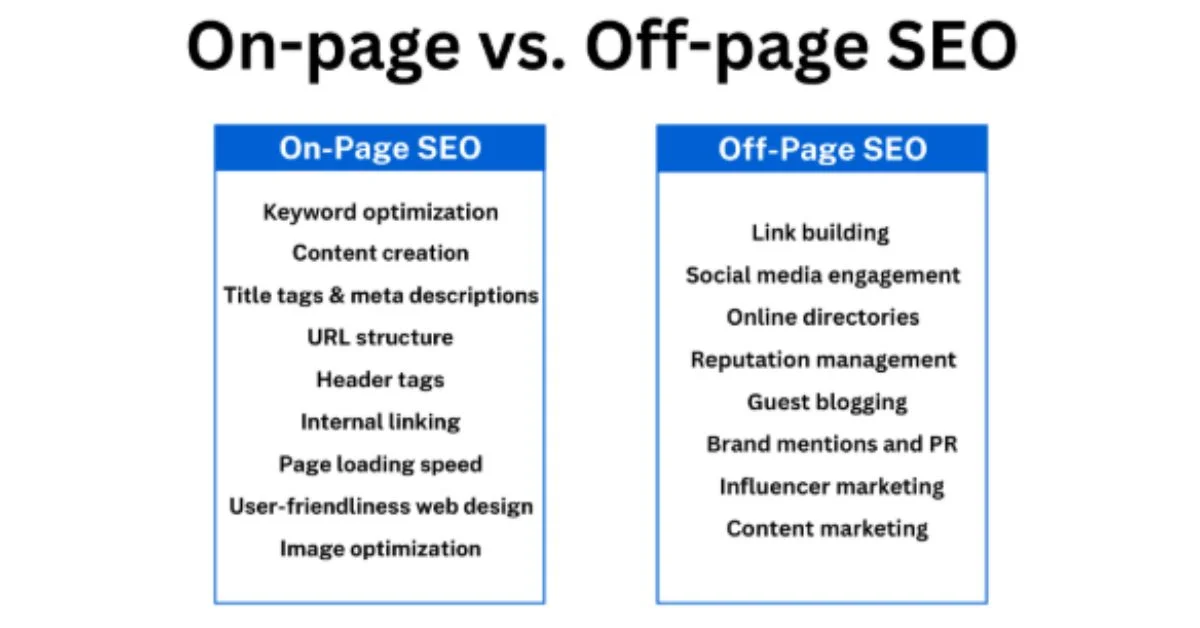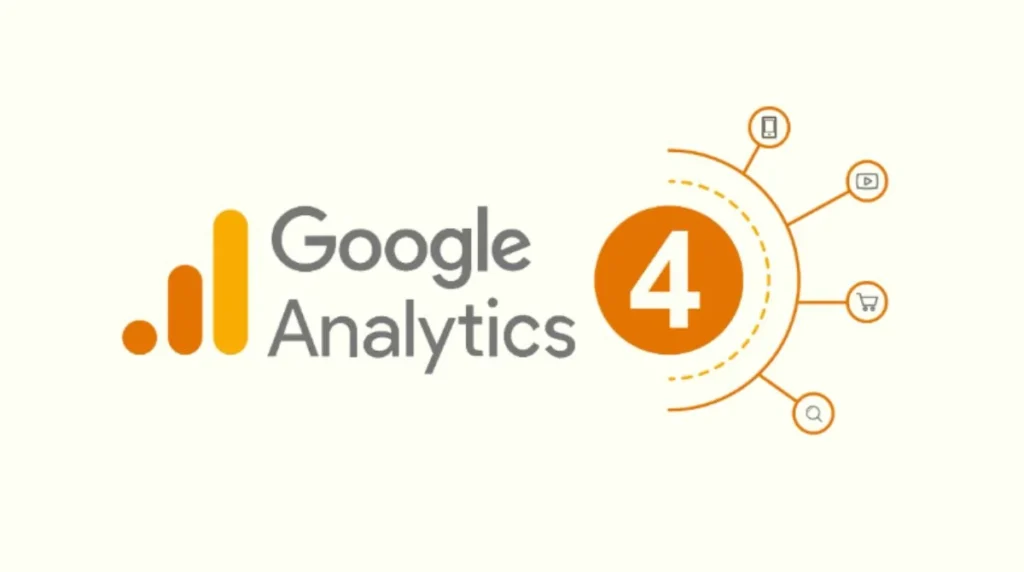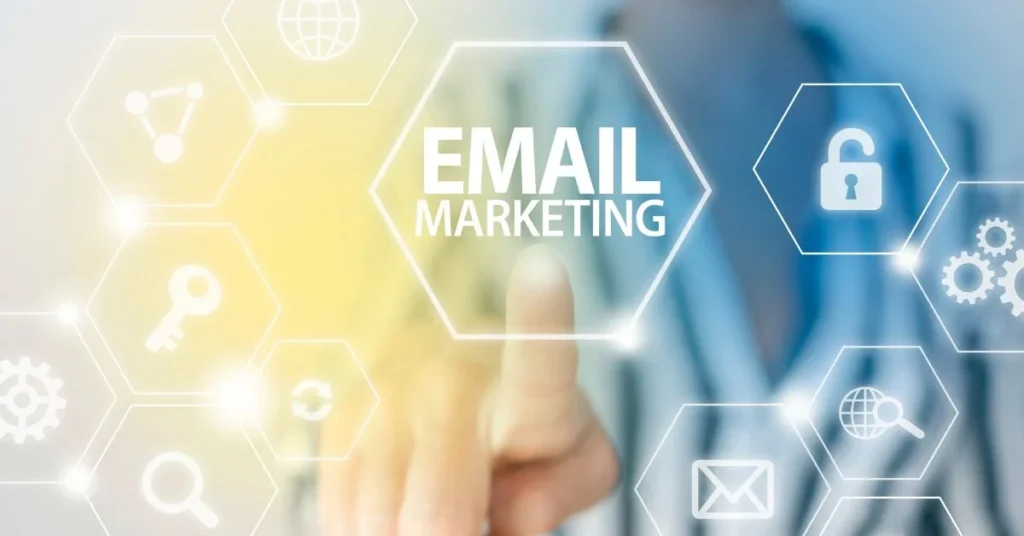Understanding On-Page SEO
On-page SEO refers to the optimization techniques applied directly to your website to improve its visibility in search engine results. This includes:
- Content Quality: Crafting informative, relevant, and engaging content that addresses the needs and queries of your target audience.
- Keyword Optimization: Incorporating relevant keywords naturally within your content, titles, headings, and meta descriptions to enhance search engine understanding.
- Meta Tags: Write compelling title tags and meta descriptions that accurately summarize your page content and encourage click-throughs.
- URL Structure: Using clear and meaningful URLs that accurately represent the page’s content.
- Internal Linking: Connecting related pages within your website to improve navigation and distribute page authority.
- Mobile-Friendliness: Ensuring your website is responsive and provides a seamless experience across all devices.
- Page Load Speed: Optimizing images and code to ensure fast loading times, enhancing user experience, and reducing bounce rates.
Implementing these on-page SEO practices helps search engines comprehend your website’s content and relevance, leading to better rankings and increased organic traffic.
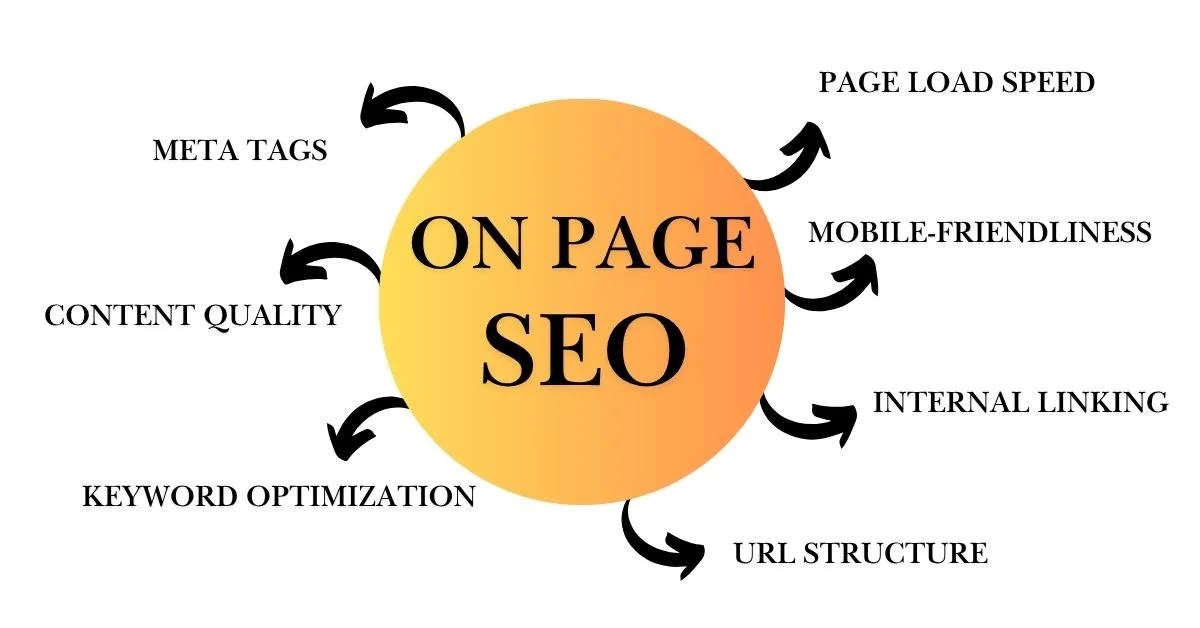
Exploring Off-Page SEO
Off-page SEO involves efforts made beyond your website that affect how well your site ranks on search engine results pages. Key elements include:
- Backlinks: Acquiring high-quality backlinks from reputable websites signals to search engines that your content is valuable and trustworthy.
- Social Media Engagement: Active participation on social media platforms can drive traffic to your website and increase brand awareness.
- Online Reviews: Encouraging satisfied customers to leave positive reviews on platforms like Google My Business enhances your credibility and local search rankings.
- Local Citations: Ensuring your business information is consistently listed across various online directories helps search engines verify your business’s legitimacy and location.
- Influencer Outreach: Collaborating with influencers or industry leaders can expand your reach and attract new audiences.
These off-page SEO strategies contribute to building your website’s authority and reputation, which are crucial factors in search engine algorithms.
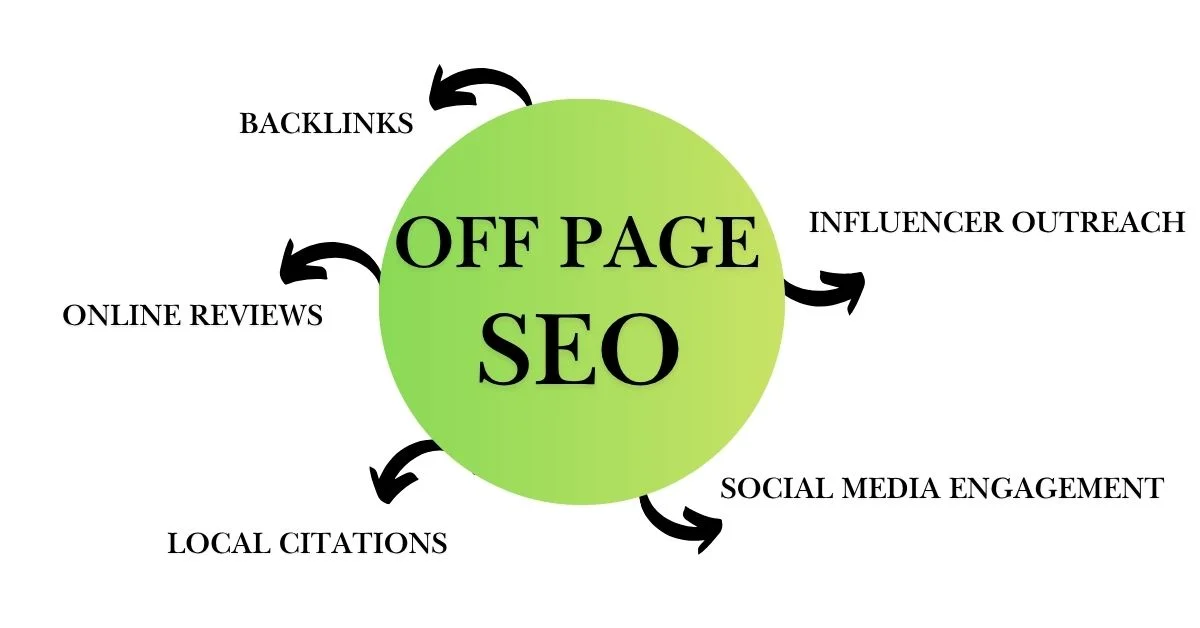
The Importance of Both for Local Businesses
For local businesses, integrating both on-page and off-page SEO is essential for maximizing online visibility and attracting potential customers. Here’s why:
- Enhanced Visibility: On-page SEO ensures your website is optimized for relevant keywords, making it easier for local customers to find you. Off-page SEO helps strengthen your website’s authority through backlinks and citations, which in turn enhance your search engine rankings.
- Increased Trust and Credibility: A properly optimized website supported by good reviews and quality backlinks builds trust with search engines as well as prospective customers.
- Competitive Advantage: Combining on-page and off-page SEO strategies positions your business ahead of competitors who may focus on only one aspect of SEO.
- Improved User Experience: On-page SEO enhances the usability and accessibility of your website, while off-page SEO extends your reach and engagement beyond your site.
Implementing a Balanced SEO Strategy
To effectively leverage both on-page and off-page SEO:
- Conduct Keyword Research: Identify the search terms your local audience uses and incorporate them into your website content.
- Optimize Your Website: Ensure your site is mobile-friendly, loads quickly, and contains high-quality, relevant content.
- Build Quality Backlinks: Reach out to local businesses, directories, and industry-related websites for backlink opportunities.
- Engage on Social Media: Share your content and interact with your audience to increase brand visibility and drive traffic.
- Encourage Customer Reviews: Prompt satisfied customers to leave reviews on platforms like Google My Business to enhance your local SEO.
By maintaining a balanced focus on both on-page and off-page SEO, local businesses can improve their search engine rankings, attract more customers, and achieve sustained growth in the digital marketplace.
Recommended Tools for On-Page & Off-Page SEO
Tools for On-Page SEO
- Google Search Console: Tracks indexing issues and keyword performance.
- Screaming Frog: Audits your website for technical and on-page issues.
- Yoast SEO / Rank Math: Helps with meta tags, headings, and readability in WordPress.
- Surfer SEO: Optimizes content using data-driven guidelines.
- PageSpeed Insights / GTmetrix: Tests your site speed and performance.
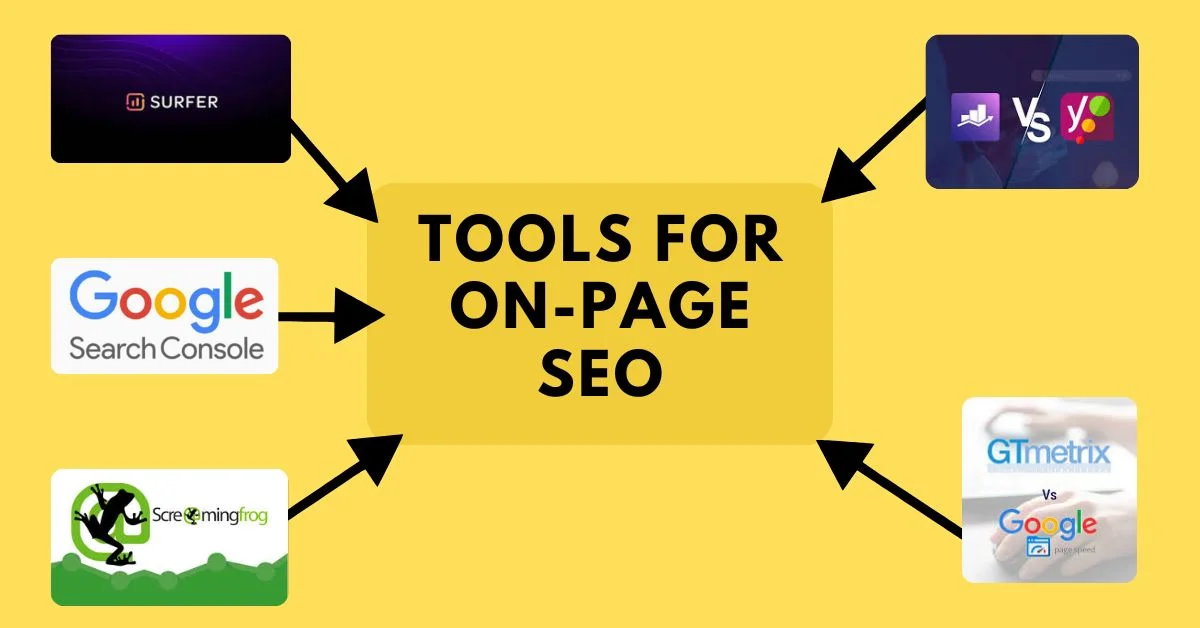
Tools for Off-Page SEO
- Ahrefs / SEMrush: Analyze backlinks, domain authority, and competitor strategies.
- Moz Link Explorer: Tracks link building and measures domain metrics.
- Google Business Profile: Manages local visibility, reviews, and map rankings.
- Whitespark / BrightLocal: Helps with citations and local SEO performance.
- BuzzSumo: Identifies shareable content and outreach opportunities.
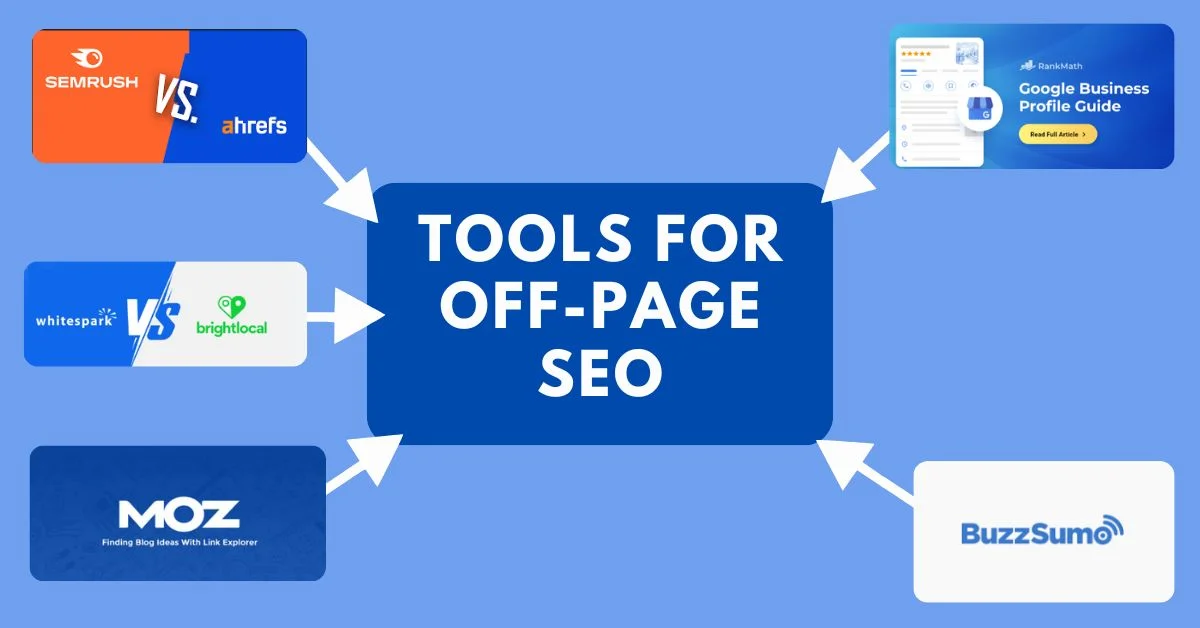
By using the right tools and applying both on-page and off-page strategies consistently, your local business can stand out in search results, attract the right audience, and turn visitors into loyal customers. It’s not about choosing one over the other, it’s about letting them work together to build long-term success.
Why You Can’t Rely on Just On-Page or Off-Page SEO?
When it comes to ranking your website on Google and growing your online business, one common mistake people make is thinking that just on-page SEO or just off-page SEO is enough. The truth is, you need both, working together like a team.
On-Page SEO Builds Your Website’s Foundation
On-page SEO includes everything you do within your website, like writing helpful content, using the right keywords, improving site speed, making sure your site works on mobile, and creating a smooth user experience. This will helps Google understand what your website is about.
If your on-page SEO is strong, your site becomes clear, structured, and easy for both users and search engines to read. But here’s the catch, even a perfectly optimized site won’t rank well if no one else is talking about it. That’s where off-page comes in.
Off-Page SEO Builds Trust and Authority
Off-page SEO includes everything happening outside your website, like backlinks from other websites, brand mentions, reviews, and social signals. This tells Google, “Other people trust this site, so maybe it should rank higher.”
You could have thousands of backlinks, but if your site is slow, outdated, or poorly written, people will leave fast, and Google will notice. That means off-page alone won’t help you in the long run either.
Think of SEO Like a Car
- On-page SEO is the engine that powers your site.
- Off-page SEO is the fuel; it keeps things moving and helps you go farther.
Without one, the other just won’t work properly.
FAQs
Q1. Will my website rank if I only do off-page SEO?
No. Backlinks and mentions help, but without a well-optimized website, users won’t stay, and Google won’t rank you for long.
Q2. Can I rank my website with just on-page SEO?
Not really. On-page SEO helps Google understand your content, but without authority signals like backlinks, rankings are limited.
Q3. Which is More Important: On-Page or Off-Page SEO?
Both are equally important. On-page builds structure; off-page builds trust.
Q4. Can I Skip Off-Page SEO if My Content is High Quality?
No. Great content is vital, but without promotion, backlinks, and engagement, Google won’t see it as credible or valuable.
Q5. Do I Need SEO if I Run Local Ads or Social Media?
Yes. SEO brings long-term, organic traffic and builds authority, something ads and social alone can’t do.
Need Help with On-Page or Off-Page SEO for Your Business?
If you’re looking to improve your website’s visibility, rank higher on Google, and attract more local customers, getting expert help can save you time and drive better results. Whether you need technical on-page optimization, powerful backlink strategies, or a complete SEO plan, RhinoClicks.com offers tailored SEO services designed to grow your business.
Conclusion
Both on-page and off-page SEO are essential parts of a successful local SEO strategy. On-page SEO helps search engines and users understand what your website is about, making sure it’s structured, relevant, and user-friendly. Off-page SEO, on the other hand, builds your credibility, authority, and online presence beyond your website.

